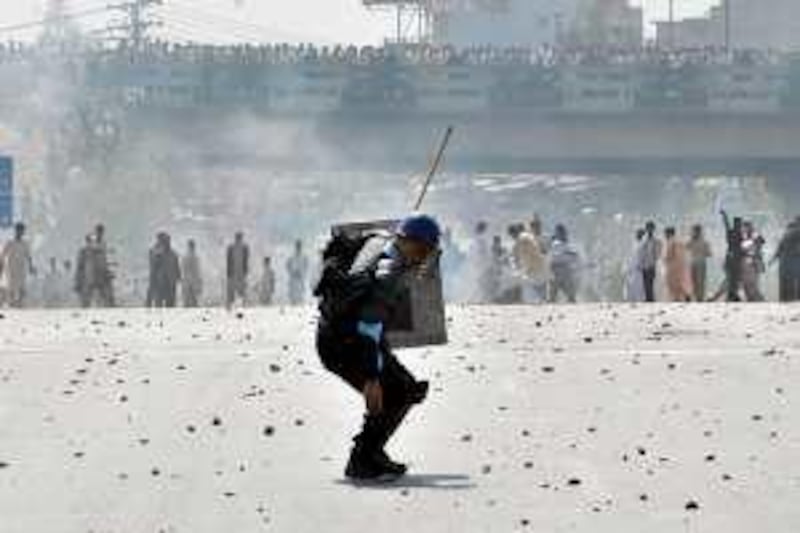ISLAMABAD // Ask the average, impoverished Pakistani what their number one grievance is and odds are they will reply: "There's no system, no law." That complaint reflects the long and widely held perception that Pakistan's system of governance exists to serve vested interest groups and to exploit and suppress the aspirations of the general public.
Increasingly, people express their frustration with the government by taking to the streets - this was most recently on display last Thursday and Friday in Islamabad. It started out as a student protest over the decision of officials in Pakistan's capital and the adjoining garrison city of Rawalpindi to approve a 40 per cent increase in public transport fares. Several hundred students in Bara Kahu, a small town on the periphery of Islamabad, reacted by staging a protest on Thursday on the Murree Road, a national motorway that links the country to about half of the disputed territory of Kashmir that Pakistan controls.
The Islamabad police, considered to be the best force in the country, responded with bamboo-cane charges - the standard security response - to disperse the protesters, but instead were met with a hail of stones. Police responded again by firing tear-gas shells and when those failed to scatter the crowds, rubber bullets. One protester was injured. All of it was broadcast live by Pakistan's numerous independent cable news channels.
A bigger confrontation erupted on Friday when the protests spread to Faizabad, a Rawalpindi suburb that sits on a vital road junction at the southern entrance to the capital. All under the watchful eyes of television cameras, large and violent mobs seized the Faizabad interchange and then attacked a detachment of the Islamabad police who were deployed to keep the roads open. Time and again, protesters charged the police and showered them in stones, injuring a number of them and forcing them to retreat.
Given the ferocity of the protests at Faizabad and the size of the crowds partaking in them, it was clear they were about more than increased transportation fares and a wounded student. This was the venting of a pent-up and widespread anger among the Pakistani public. Minute-by-minute updates on cable news channels revealed the diversity of those involved in the protests. Apart from ordinary Pakistanis, there were student unions affiliated to political parties at odds with the ruling federal coalition of Asif Ali Zardari, the president.
Prominent among them were activists of the Muslim Students Federation, a group tied to the Muslim League party of Nawaz Sharif, the opposition leader, whose brother, Shahbaz Sharif, heads the provincial government of Punjab province. They were filmed giving directions to the mob, which took to chanting slogans against Mr Zardari and his Pakistan People's Party, before launching attacks on the Islamabad police.
Suspicions of political gamesmanship deepened when detachments of Punjab police, apparently sympathetic to the protesters, refused to respond to calls for assistance from their Islamabad colleagues and instead allowed the mob to regroup and launch fresh protests across the invisible border between the Twin Cities, as Islamabad and Rawalpindi are commonly referred to. That provoked an angry, on-camera response from a bleeding Hakim Khan, the superintendent heading the besieged Islamabad police detachment, who shouted at his Rawalpindi counterparts: "What is the matter with you people? You ought to be ashamed.
"They aren't coming to our rescue because they have been ordered not to," he told gathered television journalists. Ultimately, it took the Islamabad police nine hours to take back control of the Faizabad interchange, after which the protesters dispersed quietly into Rawalpindi. The rapid degeneration of a student protest over price inflation into a siege of the federal government was a demonstration of the rage brewing among Pakistan's poor, who make up some 75 per cent of the country's estimated 170 million population.
They have reason to be angry: three years of political instability and terrorist insurgency have crippled the economy, but international commodity price escalation and manipulation of essential consumer item markets by powerful local speculators have created stagflation that has, in turn, led to a rapid deterioration in the quality of life for most Pakistanis. Failures of governance have exacerbated the situation, notably by depriving homes and businesses of electricity supplies, often for half the day, destroying businesses and rendering thousands of workers redundant. Among the worst hit cities has been the Punjab industrial hub of Faisalabad, the scene of days of rioting last summer, when power cuts were at their peak.
Ironically, as the Punjab police stood aside in Rawalpindi last week, the provincial administration was calling up federal paramilitary troops to pre-empt a repeat performance in Faisalabad, following a sudden rise in power blackouts during a heatwave sparked by nationwide drought. The spiral of violence seen in Islamabad may well have been an isolated incident, but it points to a loss of faith in governance that, as has often been the case in Pakistan's chequered political past, can be exploited by vested interest groups.
Certainly, there will be plenty of fuel at their disposal as temperatures and tempers rise as the summer sets in, and worsening power blackouts render inoperative the income sources, ceiling fans, refrigerators and televisions that would usually distract the public from their financial woes. thussain@thenational.ae





